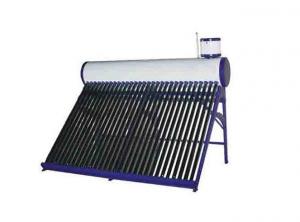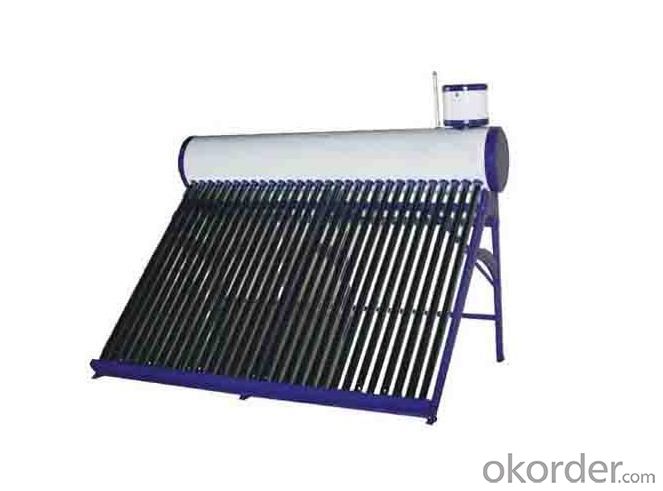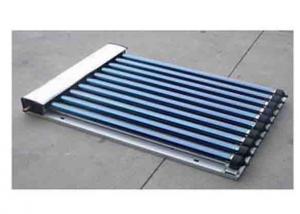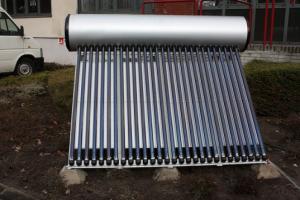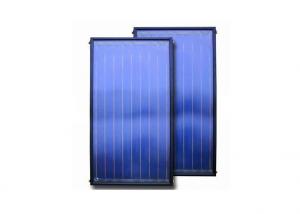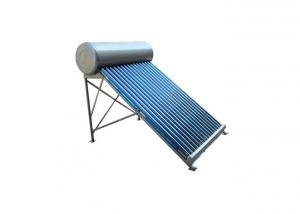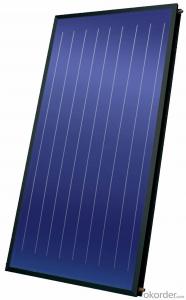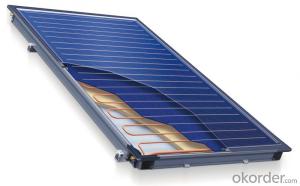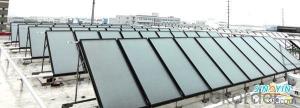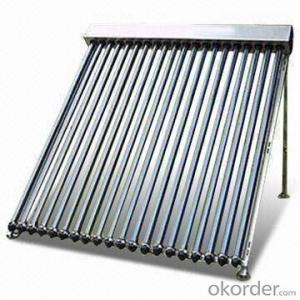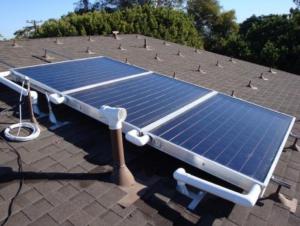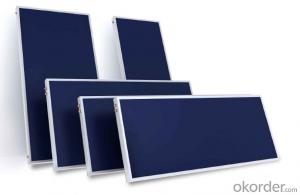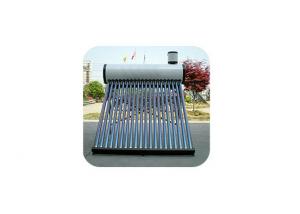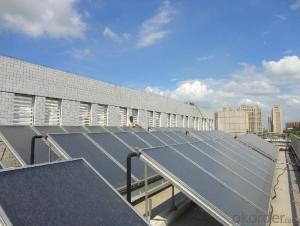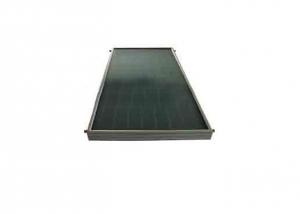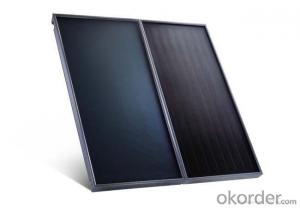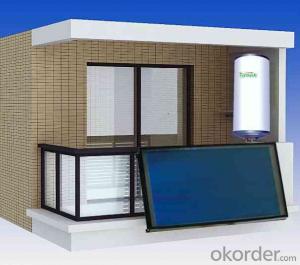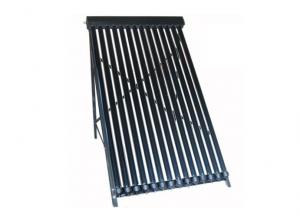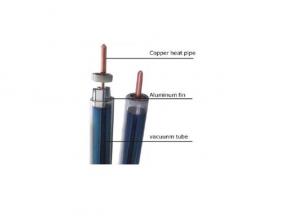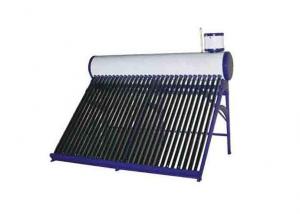Pre-Heated Solar Water Heater with Flat Plate Solar Collectors
- Loading Port:
- China Main Port
- Payment Terms:
- TT or LC
- Min Order Qty:
- 1 Set set
- Supply Capability:
- 3000 Sets per Month set/month
OKorder Service Pledge
OKorder Financial Service
You Might Also Like
Detailed Product Description
1.copper coil in the water tank
2.Seven years trading experience
3.Perfect credit records.
No need searching from now on.
We are the best choice for you.
Solar water heater Features:
1.It can withstand tap water pressure when its working.Kindly noted that not the storage tank bear pressure but the copper coil.
2.Drinking water quality: Its indirect solar system,so the water quality is same as tap water.
3.No afraid the storage tank have no water.
4.Economical and suitable for use,no afraid the extra cost after installion.
5.No need to wait,hot water is stand by anytime.
Solar water heater Specifications:
1.Inner tank material: SUS304-2B food grade,thinckness 0.41mm.
2.Outer tank material:PVDF coated steel/Stainless steel 0.31mm.
3.Frame:1.5mm thickness printed galvanized steel/1.2mm aluminum alloy.
4.Assistant tank:5L(optional).
5.Heat exchanger:Red copper,diameter: φ12mm,thickness:0.8mm.
6.Heat preservation:72hours.
7.Vacuum tube: φ58*1800mm single element vacuum tube.
- Q: Can solar collectors be used for heating correctional facilities?
- Yes, solar collectors can be used for heating correctional facilities. Solar thermal systems can effectively generate hot water or provide space heating for correctional facilities by harnessing the sun's energy. This not only helps reduce operating costs but also promotes sustainability and decreases reliance on fossil fuels. Additionally, implementing solar collectors can contribute to the overall environmental goals of correctional facilities.
- Q: How do solar collectors impact property values?
- Solar collectors can have a positive impact on property values as they are considered a desirable and sustainable feature. They can add to the overall appeal and attractiveness of a property, potentially increasing its market value. Additionally, solar collectors can reduce energy costs, which can be an attractive selling point for potential buyers and contribute to the overall value of the property.
- Q: Can solar collectors be used for heating tourist attractions and theme parks?
- Yes, solar collectors can be used for heating tourist attractions and theme parks. Solar thermal systems can be effectively utilized to heat water or air, providing a sustainable and cost-effective solution for maintaining comfortable temperatures in these locations. By harnessing solar energy, these collectors can help reduce carbon emissions and dependence on traditional heating methods, making them an environmentally friendly choice for heating tourist attractions and theme parks.
- Q: Can solar collectors be used in areas with limited access to certification bodies?
- Yes, solar collectors can be used in areas with limited access to certification bodies. While certification is important to ensure the quality and safety standards of solar collectors, it is not always mandatory. In such cases, it becomes the responsibility of the user or installer to ensure that the solar collectors meet the necessary requirements and standards. They can do so by conducting thorough research on reputable manufacturers, checking for customer reviews and testimonials, and consulting with experts or professionals in the field. Additionally, in areas with limited access to certification bodies, local regulations and guidelines may provide alternative ways to ensure the reliability and performance of solar collectors.
- Q: Can solar collectors be used in conjunction with other renewable energy sources?
- Yes, solar collectors can be used in conjunction with other renewable energy sources. Many renewable energy systems, such as hybrid solar-wind or solar-hydro, combine solar collectors with other sources to enhance energy production and reliability. This integrated approach allows for a more diverse and sustainable energy mix, maximizing the benefits of multiple renewable sources.
- Q: How long does it take to recoup the cost of installing solar collectors?
- The time it takes to recoup the cost of installing solar collectors can vary depending on several factors such as the initial investment, energy consumption, local solar resource, and available incentives. On average, it takes about 5 to 15 years to recover the upfront costs through energy savings. However, with government incentives and falling solar panel prices, the payback period has been decreasing and making solar installations more financially attractive in recent years.
- Q: Can solar collectors be used to generate electricity for remote communication systems?
- Yes, solar collectors can be used to generate electricity for remote communication systems. Solar collectors, such as solar panels, can convert sunlight into electricity through the photovoltaic effect. This generated electricity can then be stored in batteries to power remote communication systems, ensuring reliable communication in areas without access to traditional power sources.
- Q: Can solar collectors be used for heating mines?
- Yes, solar collectors can be used for heating mines. Solar thermal systems can be installed to capture and convert sunlight into heat energy, which can then be used to warm up the mines. This can be a cost-effective and environmentally friendly alternative to traditional heating methods, reducing reliance on fossil fuels and lowering carbon emissions.
- Q: Can solar collectors be used for heating water for agricultural purposes?
- Yes, solar collectors can be used for heating water for agricultural purposes. Solar water heating systems can provide a cost-effective and sustainable solution for heating water used in various agricultural processes such as crop irrigation, livestock watering, and greenhouse heating. By harnessing the sun's energy, solar collectors can efficiently heat water, reducing the reliance on fossil fuels and lowering operating costs for farmers.
- Q: How do evacuated tube solar collectors work?
- Evacuated tube solar collectors work by utilizing a vacuum-sealed glass tube design. The outer layer of the tube is transparent and allows sunlight to pass through, while the inner layer is coated with a special material that absorbs the solar radiation. This absorbed heat is then transferred to a fluid (usually water or a mixture of water and glycol) that flows through a copper or aluminum pipe inside the tube. The fluid, now heated, is then circulated to a storage tank where it can be used for various purposes like heating water or space. The vacuum insulation helps to minimize heat loss, making evacuated tube solar collectors highly efficient even in colder climates or during cloudy days.
1. Manufacturer Overview
| Location | Zhejiang, China |
| Year Established | 2004 |
| Annual Output Value | US$10 Million - US$50 Million |
| Main Markets | North America South America Eastern Europe Southeast Asia Africa Oceania Mid East Eastern Asia Western Europe |
| Company Certifications | ISO 9001:2000 ;CE ;Solar Keymark |
2. Manufacturer Certificates
| a) Certification Name | |
| Range | |
| Reference | |
| Validity Period |
3. Manufacturer Capability
| a) Trade Capacity | |
| Nearest Port | Shanghai,Ningbo |
| Export Percentage | 51% - 60% |
| No.of Employees in Trade Department | 6-10 People |
| Language Spoken: | English, Chinese |
| b) Factory Information | |
| Factory Size: | 10,000-30,000 square meters |
| No. of Production Lines | Above 10 |
| Contract Manufacturing | OEM Service Offered Design Service Offered Buyer Label Offered |
| Product Price Range | Average |
Send your message to us
Pre-Heated Solar Water Heater with Flat Plate Solar Collectors
- Loading Port:
- China Main Port
- Payment Terms:
- TT or LC
- Min Order Qty:
- 1 Set set
- Supply Capability:
- 3000 Sets per Month set/month
OKorder Service Pledge
OKorder Financial Service
Similar products
Hot products
Hot Searches
Related keywords
